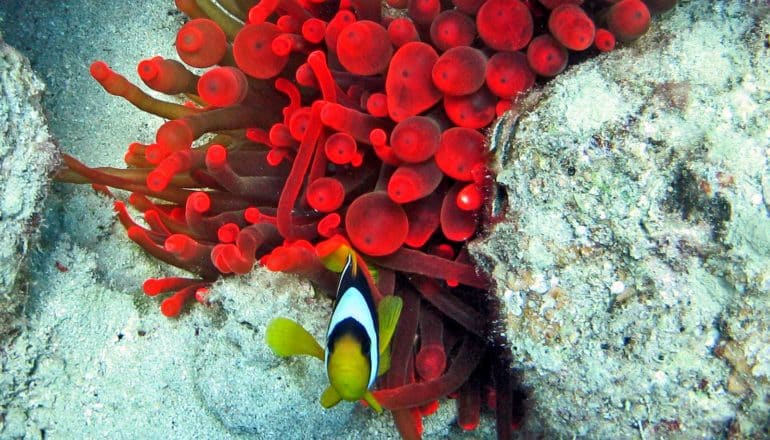
The coral reef ecosystem in the Red Sea’s Gulf of Aqaba is strikingly resilient to rising sea temperatures, say researchers.
Rapid ocean warming due to climate change is predicted to decimate 70 to 90% of the world’s coral reefs by mid-century, cite the researchers in their appeal to UNESCO to declare the Red Sea’s 2,500 miles of coral reef as a Marine World Heritage Site. They also recommend additional measures critical to the reef’s survival in their paper, which appears in Frontiers in Marine Science.
Corals in the Gulf of Aqaba, at the northernmost portion of the Red Sea, withstand water temperature irregularities that cause severe bleaching or mortality in most hard corals elsewhere. This uniquely resilient reef employs biological mechanisms that are likely to be important for coral survival as the planet’s oceans warm. But while the Gulf of Aqaba could potentially be one of the planet’s largest marine refuges from climate change, its reef will only survive and flourish if serious regional environmental challenges are addressed.
“Corals of the Gulf of Aqaba, in the northern Red Sea, may constitute one of the last reefs to survive the century, so it’s crucial that countries coordinate on Gulf-wide research and conservation efforts despite regional political tensions,” says study leader Karine Kleinhaus, visiting associate professor at the Stony Brook University School of Marine and Atmospheric Sciences (SoMAS).
The authors point out that coral reefs of the Red Sea provide food and a source of livelihood to a rapidly growing population of over 28 million people living along its coastline, and are a uniquely rich potential source of new medicines.
However, as towns and cities continue to grow along the Red Sea, these areas generate substantial local pressure on its reefs. Some portions of the reef have already been heavily damaged by uncontrolled tourism, human population expansion, overfishing, and coastal development that has led to pollution and a decline in coastal water quality.
Despite existing environmental stressors and newly emerging threats, there are currently no coordinated scientific research or management efforts that encompass the entire Red Sea reef complex.
The researchers assert that the most urgent objective is to advance immediate protection of the Gulf of Aqaba as a World Heritage Site as part of an initiative involving Egypt, Israel, Jordan, and Saudi Arabia.
Ideally, they say scientists, conservationists, and policy makers should advocate strongly that UNESCO recognize the Red Sea’s entire coral reef as a Marine World Heritage Site. Regional scientists and governments should work together to implement transnational research, monitoring, and conservation efforts and seek UN support for a long-term scientific monitoring program.
Considering political realities, the authors affirm that the Transnational Red Sea Center, a neutral organization established in March 2019 and based at the Swiss Ecole Polytechnique Fédérale de Lausanne (EPFL), can effectively facilitate regional collaboration.
The researchers recommend several additional measures including:
- Full regional cooperation under the directive of high levels of government;
- Informing governments of the monetary value and vast medicinal potential of the reef to each nation;
- Long-term regional monitoring of the threat to the reefs from new coastal development and the accompanying population expansion; and
- Sustainable development of the Red Sea coastline
Coauthors of the study are from Bar-Ilan University’s Mina and Everard Goodman Faculty of Life Sciences, along with a group of scientists who have studied the Red Sea’s corals while based in Egypt, Israel, Jordan, Saudi Arabia, Australia, the United States, and Switzerland. The Swiss Ambassador to Israel also contributed to the article.
Source: Stony Brook University
The post This coral reef is super resilient. Here’s the plan to save it appeared first on Futurity.
from Futurity https://ift.tt/2TS3lTQ
No comments:
Post a Comment